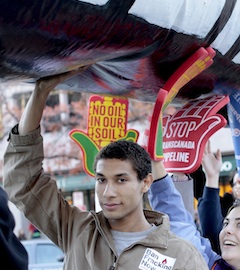Did you know that Truthout is a nonprofit and independently funded by readers like you? If you value what we do, please support our work with a donation.
The State Department announced yesterday that the review process for the Keystone XL pipeline would be extended until after the 2012 election. The announcement came just four days after thousands of protesters peacefully surrounded the White House to pressure President Obama to reject the massive project.
State Department officials said the administration needs more time to assess the potential environmental impacts of the pipeline, but the decision also lifts the president out of a political dilemma as the 2012 election season begins.
The proposed $7 billion pipeline sparked outcry and protests across the country, and the demonstrators who encircled the White House on November 6 made it clear that young voters and environmentalists, two key factions of the president's voter base, are holding Obama to his campaign promise to move the country away from its dependence on oil.
“I 100 percent think that young people were … a large part of what drove the decision,” said Courtney Hight, a director of the Energy Action Coalition, a group that organizes young activists. “Young people are what brought him into the White House, and he knows that.”
Hight would know, she began working for the Obama campaign in 2007 and soon became the campaign's Youth Vote director for Florida. After the election, Hight landed a job on the White House's environmental quality council where she worked until June 2011. In September, Hight was arrested outside the White House along with 1,200 other anti-pipeline protesters during a two-week sit-in.
“The American people spoke loudly about climate change and the president responded,” said Bill McKibben, a climate writer and founder of 350.org, who spearheaded the anti-pipeline protests. “There have been few even partial victories about global warming in recent years so that makes this an important day. The president deserves thanks for making this call – it's not easy in the face of the fossil fuel industry and its endless reserves of cash.”
The proposed 1,700-mile Keystone XL pipeline would pump 830,000 barrels of crude oil a day from the Alberta tar sands across six states to the Gulf of Mexico. Environmentalists say extracting and refining tar sands oil is an environmentally destructive process and the pipeline would threaten wildlife areas, farmland and underground domestic water supplies.
The State Department said a key area of concern is the Sand Hills of Nebraska, home to fragile wetlands and shallow underground water supplies. The Department will examine in-depth alternative routes to avoid the Sand Hills, according to a release.
Hight said the environmental movement found “unlikely bedfellows” in Nebraska, where red-state ranchers united with environmentalists to oppose the pipeline. TransCanada has allegedly threatened landowners in Nebraska with eminent domain, and lawmakers in the state recently called a special session on the issue.
“We collaborated in a way that the environmental community has not done in a very long time,” Hight said.
McKibben said that, until recently, the Keystone XL pipeline appeared to be a done deal. Industry insiders expected the project to be approved by a now defunct year-end deadline, and TransCanada, the company behind the project, had already begun moving segments of pipe across the border.
The Obama administration could still approve the project in 2013 after an extended review is completed. Canadian officials have already said they are looking to sell their oil in other markets, and some analysts say the extension could effectively kill the project.
For now, the decision seems to have appeased the environmentalists and activists who put mounting pressure on Obama in recent months.
“The bottom line is, when President Obama stands up to big oil, we stand with him,” McKibben said.
Earlier this week, the State Department's inspector general announced an investigation into potential conflicts of interests surrounding the pipeline permitting process, including TransCanada's successful recommendation that Cardno Entrix, a major client of TransCanada, conduct the environmental review for the State Department.
The Environmental Protection Agency would normally conduct the environmental review of an inter-state project, but the State Department worked with Cardno Entrix on the review because the pipeline would cross an international border.
Media that fights fascism
Truthout is funded almost entirely by readers — that’s why we can speak truth to power and cut against the mainstream narrative. But independent journalists at Truthout face mounting political repression under Trump.
We rely on your support to survive McCarthyist censorship. Please make a tax-deductible one-time or monthly donation.
